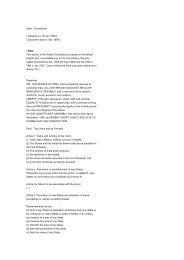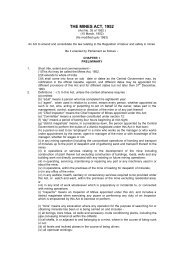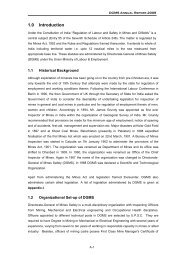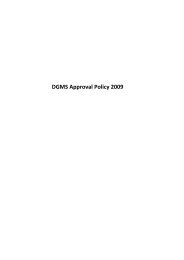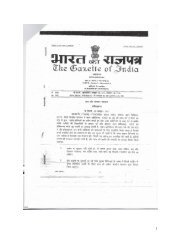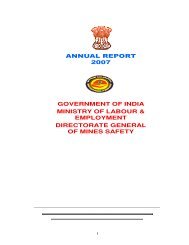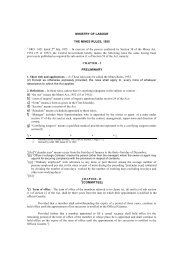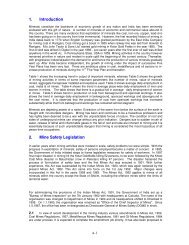Metalliferous Mines Regulations, 1961 - Directorate General of ...
Metalliferous Mines Regulations, 1961 - Directorate General of ...
Metalliferous Mines Regulations, 1961 - Directorate General of ...
You also want an ePaper? Increase the reach of your titles
YUMPU automatically turns print PDFs into web optimized ePapers that Google loves.
(2) Every winding engineman shall during his shift keep the winding engine and apparatus connected<br />
therewith properly cleaned and oiled, and shall see that the engine room is clean and free <strong>of</strong> inflammable<br />
material.<br />
(3) The winding engineman shall immediately report in writing to the engineer or other competent person<br />
appointed for the purpose any defect which he has noticed in the engine, brake, indicator, drum, rope or<br />
other appliances under his charge.<br />
(4)The winding engineman shall not allow any unauthorised person to enter the engine room or in any way<br />
to interfere with the engine.<br />
(5) Every winding engineman shall thoroughly acquaint himself with, and carefully attend to, the<br />
prescribed code <strong>of</strong> signals; and shall not start the engine until he has received the proper signal to do<br />
so. If the signal is indistinct, he shall not start the engine until it has been repeated and he clearly<br />
understands it.<br />
(6) The winding engineman shall avoid jerk in starting, running and stopping the engine, and shall cause<br />
the cage or other means <strong>of</strong> conveyance to be brought gently to rest at any stopping place.<br />
(7) While persons are being lowered or raised in the shaft, the winding engineman shall not drive the<br />
engine at a speed higher than that fixed by the manager for manwinding purposes and approved by the<br />
Regional Inspector by an order in writing.<br />
(8) The winding engineman shall not unclutch the drum <strong>of</strong> his engine until he has assured himself<br />
immediately beforehand by testing the brake <strong>of</strong> the drum against the full power <strong>of</strong> the engine that the<br />
brake is in proper condition to hold the load suspended from the said drum. When the drum is<br />
unclutched, he shall use the brake only for th epurpose <strong>of</strong> maintaining such drum stationery, and shall<br />
not lower men or materials from an unclutched drum.<br />
(9) The winding engineman shall on no pretext leave the handle or brake whilst the engine is in motion, or<br />
while persons are riding a cage or other means <strong>of</strong> conveyance in the shaft.<br />
(10) The winding engineman shall not leave the engine whilst persons are at work in the shaft. Whenever he<br />
has occasion to leave the engine, he shall secure the drums with the brake and cut <strong>of</strong>f the power.<br />
(11) The winding engineman <strong>of</strong> a winding engine by wich persons are lowered or raised in a shaft, shall not<br />
leave the engine at the end <strong>of</strong> his shift unless all the persons have come out <strong>of</strong> shaft or unless relieved<br />
by a duly appointed substitute.<br />
55. Duties <strong>of</strong> banksmen, bellmen and signalmen. – (1) Every banksman, bellmen and sig nalmen, as the case<br />
may be, shall observe the following provisions, -<br />
(a) He shall, subject to the orders <strong>of</strong> a superior <strong>of</strong>ficial, have full control <strong>of</strong> the top or bottom <strong>of</strong> shaft and<br />
the inset, as the case may be and shall report to such <strong>of</strong>ficial any person who, without authority, gives a<br />
signal or disobeys instructions.<br />
(b) He shall thoroughly acquaint himself with, and carefully attend to, the prescribed code <strong>of</strong> signals, and<br />
shall properly transmit the signals by the means provided. He shall not act on any signal the<br />
correctness <strong>of</strong> which he is in doubt, except a signal which he believes to be “to stop”. He shall not<br />
allow any unauthorised person to give signals.<br />
(c) He shall immediately report to his superior <strong>of</strong>ficial any defect in the signalling installation.





